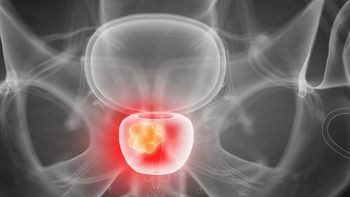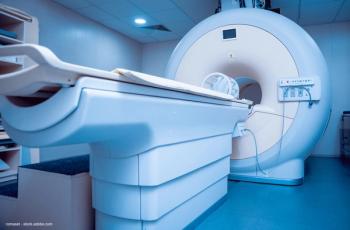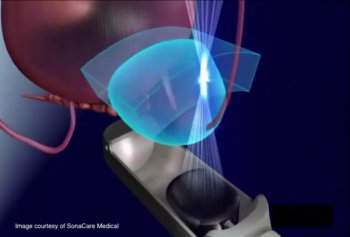
Prostate Cancer
Latest News
Latest Videos

CME Content
More News

Injection of an absorbable perirectal hydrogel spacer prior to radiotherapy for prostate cancer may reduce rectal irradiation and the associated rectal toxic effects that manifest clinically after longer-term follow-up.

A subgroup analysis of the pivotal phase 3 ARAMIS trial showed that the efficacy of darolutamide was sustained in patients with a rapid PSA double time.

Mediterranean diet score was modestly associated with time to grade group progression.

"This new therapy could change the landscape for the treatment of advanced prostate cancer," Thrasher writes.

“Our findings suggest that genomic score and PSA density are risk factors for upgrading within 3 years of commencing active surveillance,” the investigators wrote.

Oral GnRH receptor antagonist has “potential to become a new standard for ADT,” a study investigator says.

Referring physicians implemented PSMA PET–based treatment changes in 72% of patients.

The phase 3 SPOTLIGHT study is assessing the diagnostic capability of rhPSMA-7.3 (18F) PET in men with suspected prostate cancer recurrence based on elevated PSA following prior therapy.

Cancers that are missed by mpMRI are significantly smaller and less aggressive than those that are detected.

The EUPROMS patient-driven quality-of-life study included data from almost 3000 men treated for prostate cancer.

In this episode, Samuel J. Peretsman, MD, describes his background and experience with HIFU as a treatment for patients with prostate cancer, and also discusses his treatment criteria for the modality.

Steroid sulfatase inhibition showed early activity as a precision option in castrate-resistant prostate cancer, including the potential to enhance response to enzalutamide.

In men who had radical prostatectomies for intermediate and high-risk disease, a delay of up to 12 months did not result in any worse outcomes compared to immediate surgery within 3 months of diagnosis.

The phase 3 CONDOR study demonstrated excellent diagnostic performance with 18F-DCFPyL–PET/CT in men with biochemically relapsed prostate cancer, even at very low PSA values.

A study found no association between Black race and risk of skeletal-related events and all-cause mortality in men with newly diagnosed, bone metastatic castration-resistant prostate cancer.

The most frequent treatment changes triggered by 18F-DCFPyL PSMA PET/CT were a shift from observation or systemic therapy to surgery or radiation, or adding nodal-directed therapy to radiation or salvage surgery.

Findings create opportunity to develop precision medicine options for this underserved patient population.

At 10 years, the risk of distant metastasis was 0.6%.

Abnormalities in the androgen receptor gene detected in men with advanced prostate cancer were associated with poor responses to available drug treatments and reduced survival.

Samuel J. Peretsman, MD, discusses which patients with prostate cancer can be treated with HIFU, contraindications to the treatment, and what expectations patients need to have postoperatively.

Dr. Badar M. Mian highlights the safety and efficacy of relugolix, describing the drug as an “exciting new option” for patients with recurrent or advanced prostate cancer.

William Lowrance, MD, and Michael S. Cookson, MD, highlight the core components of the new AUA Guideline for Advanced Prostate Cancer.

The American Urological Association, American Society for Radiation Oncology, and Society of Urologic Oncology have released a joint guideline for advanced prostate cancer to address the growing treatment options and complexity of the paradigm.

A real-world analysis found that nerve sparing robot-assisted radical prostatectomy increased the risk of ipsilateral positive surgical margins.

177Lu-PSMA-617, an investigational radioligand therapy, showed stronger clinical activity than cabazitaxel in patients with metastatic castration-resistant prostate cancer previously treated with docetaxel.














